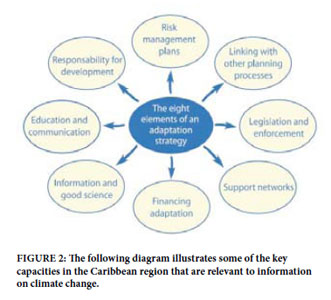 |
 |
 |
|
June 2012
|
Caribbean Farmers and the Race against Climate ChangeBy Kurina Baksh Climate change is already happening. Despite efforts to reduce the emission of greenhouse gases on an international level, the climate will continue to adjust to past and present emissions for the next few decades. With the world population finally crossing the seven billion mark and the corresponding increase in demand for food and nutrition, climate change is a real concern for the sustainable development of agriculture, both globally and within small island developing states (SIDS). According to the United Nations Environment Programme, 2008, SIDS have a limited capacity to adapt to climate change. The main barriers to adaptation include inadequate data on appropriate options, limited financial resources and a shortage of farm labour. As a result, there is a crucial need for the development of a policy framework that promotes and rewards investments in capacity building and stakeholder organization.
Extension involves the distribution of research knowledge and information and is a key component in supporting agriculture’s role in capacity building. Extension programmes can help farmers prepare for greater climate variability, create contingency measures to deal with exponentially increasing risk, and reduce the consequences of climate change by providing advice on how to deal with droughts and floods. Extension can also help with mitigation of climate change by providing links to new markets as well as to new government priorities and policies. Establishing a Farmer Field School (FFS) is one agricultural extension element that can be employed to promote capacity building and stakeholder organization.
However, this method requires a lot of time from both farmers and extension agents as opposed to if technical recommendations were given, and experiments may not always be successful. It also requires substantial changes to the capacity of agricultural extension with respect to policies and execution. One study recommends that governments should encourage adaptation by ensuring that farmers have access to affordable credit; land to increase their ability; flexibility to change production strategies in response to climate change, and that extension services of the Ministry of Agriculture reach rural farmers. Additionally, it recommended that governments encourage research; training and communication among farmers, and wider involvement of extension practitioners and research institutes concerning the most appropriate adaptive options. (Editor’s Note: Trinidad and Tobago has conducted more than 40 Farmer Field Schools, and The UWI has participated in ‘Training of trainers’ exercises to spread the FFS concept throughout the Caribbean.) Students in the Faculty of Science and Agriculture doing a Semester I course in Environmental Economics were asked to work in groups and produce papers on various environmental issues. This is an excerpt from one of the papers. |

 Capacity building and stakeholder organization will play essential roles in both the mitigation of emissions and adaptation to climate change as related to agriculture, and will require open markets, protection of intellectual property rights and government support, such as agricultural extension programmes.
Capacity building and stakeholder organization will play essential roles in both the mitigation of emissions and adaptation to climate change as related to agriculture, and will require open markets, protection of intellectual property rights and government support, such as agricultural extension programmes. The FFS is a group-based learning institution that was designed by the Food and Agricultural Organisation in 1989. FFS aims to integrate concepts and methods from agro-ecology with experimental education and community development by reinforcing the farmers’ understanding of ecological processes that affect the production of their crops and animals. This is achieved through field observations, conducting experiments and the analysis of groups. FFS helps farmers adapt to climate change by helping them to understand the various processes that can affect the performance of their production systems. The advantages of adopting this type of technology include reaching larger numbers of small scale farmers through group training, enabling farmers to adapt training methods, and giving them a feeling of greater control in agricultural development.
The FFS is a group-based learning institution that was designed by the Food and Agricultural Organisation in 1989. FFS aims to integrate concepts and methods from agro-ecology with experimental education and community development by reinforcing the farmers’ understanding of ecological processes that affect the production of their crops and animals. This is achieved through field observations, conducting experiments and the analysis of groups. FFS helps farmers adapt to climate change by helping them to understand the various processes that can affect the performance of their production systems. The advantages of adopting this type of technology include reaching larger numbers of small scale farmers through group training, enabling farmers to adapt training methods, and giving them a feeling of greater control in agricultural development.